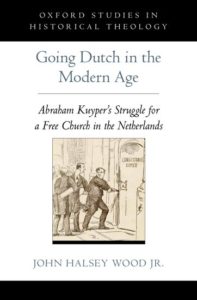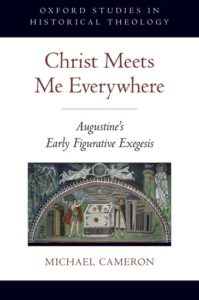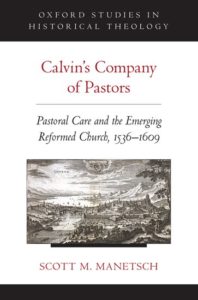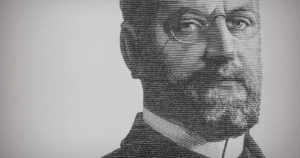
Author’s Corner: Oxford Studies in Historical Theology
Each week on Credo we welcome you to join us in the Author’s Corner where we will meet a set of authors whose recent books deserve your attention and might even help you grow in your knowledge of theology, history, philosophy, and the scriptures. We hope the Author’s Corner can keep you up-to-date on the most important books published today and where you can find them.
On today’s Author’s Corner, we present you with a selection from the Oxford Studies in Historical Theology, edited by Richard A. Muller (Oxford University Press).
Oxford University Press established in 1994 a new series of original monographs devoted to the history of Christian thought from its early and medieval beginnings to its later development in the modern period. The underlying assumption held from the first was that Christian ideas from the past can best be understood when scholars present them in their proper historical and cultural context. For 20 years the distinguished authors in this series have treated a wide variety of intellectual problems from the Christian past and, by so doing, have redefined the discipline of historical theology for the foreseeable future.
G oing Dutch in the Modern Age: Abraham Kuyper’s Struggle for a Free Church in the Netherlands (OUP, 2013) by John Halsey Wood Jr.
oing Dutch in the Modern Age: Abraham Kuyper’s Struggle for a Free Church in the Netherlands (OUP, 2013) by John Halsey Wood Jr.
Abraham Kuyper is known as the energetic Dutch Protestant social activist and public theologian of the 1898 Princeton Stone Lectures, the Lectures on Calvinism. In fact, the church was the point from which Kuyper’s concerns for society and public theology radiated. In his own words, ”The problem of the church is none other than the problem of Christianity itself.” The loss of state support for the church, religious pluralism, rising nationalism, and the populist religious revivals sweeping Europe in the nineteenth century all eroded the church’s traditional supports. Dutch Protestantism faced the unprecedented prospect of ”going Dutch”; from now on it would have to pay its own way. John Wood examines how Abraham Kuyper adapted the Dutch church to its modern social context through a new account of the nature of the church and its social position. The central concern of Kuyper’s ecclesiology was to re-conceive the relationship between the inner aspects of the church–the faith and commitment of the members–and the external forms of the church, such as doctrinal confessions, sacraments, and the relationship of the church to the Dutch people and state. Kuyper’s solution was to make the church less dependent on public entities such as nation and state and more dependent on private support, especially the good will of its members. This ecclesiology de-legitimated the national church and helped Kuyper justify his break with the church, but it had wider effects as well. It precipitated a change in his theology of baptism from a view of the instrumental efficacy of the sacrament to his later doctrine of presumptive regeneration wherein the external sacrament followed, rather than preceded and prepared for, the intenral work grace. This new ecclesiology also gave rise to his well-known public theology; once he achieved the private church he wanted, as the Netherlands’ foremost public figure, he had to figure out how to make Christianity public again.
C hrist Meets Me Everywhere: Augustine’s Early Figurative Exegesis (OUP, 2012) by Michael Cameron
hrist Meets Me Everywhere: Augustine’s Early Figurative Exegesis (OUP, 2012) by Michael Cameron
Most readers first encounter Augustine’s love for Scripture’s words in the many biblical allusions of his masterwork, the Confessions. Augustine does not merely quote texts, but in many ways makes Scripture itself tell the story. In his journey from darkness to light, Augustine becomes Adam in the Garden of Eden, the Prodigal Son of Jesus’ parable, and the Pauline double personality at once devoted to and rebellious against God’s law. Throughout he speaks the words of the Psalms as if he had written them. Crucial to Augustine’s self-portrayal is his skill at transposing himself into the texts. He sees their properties and dynamics as his own, and by extension, every believing reader’s own. In Christ Meets Me Everywhere, Michael Cameron argues that Augustine wanted to train readers of Scripture to transpose themselves into the texts in the same way he did, by the same process of figuration that he found at Scripture’s core. Augustine discovered this skill by learning to read Scripture as a work of divine rhetoric that mirrors the humility of the human Christ who forms humble readers to ascend its spiritual heights. Tracking Augustine’s developing skill in reading Scripture’s figures as microcosms of the history of salvation during the first fifteen years of his Christian life, Cameron shows how Christ’s self-transposition into Scripture’s readers became the key to Augustine’s hermeneutics.
C alvin’s Company of Pastors: Pastoral Care and the Emerging Reformed Church, 1536-1609 (OUP, 2015) by Scott M. Manetsch
alvin’s Company of Pastors: Pastoral Care and the Emerging Reformed Church, 1536-1609 (OUP, 2015) by Scott M. Manetsch
In Calvin’s Company of Pastors, Scott Manetsch examines the pastoral theology and practical ministry activities of Geneva’s reformed ministers from the time of Calvin’s arrival in Geneva until the beginning of the seventeenth century. During these seven decades, more than 130 men were enrolled in Geneva’s Venerable Company of Pastors (as it was called), including notable reformed leaders such as Pierre Viret, Theodore Beza, Simon Goulart, Lambert Daneau, and Jean Diodati. Aside from these better-known epigones, Geneva’s pastors from this period remain hidden from view, cloaked in Calvin’s long shadow, even though they played a strategic role in preserving and reshaping Calvin’s pastoral legacy.
Making extensive use of archival materials, published sermons, catechisms, prayer books, personal correspondence, and theological writings, Manetsch offers an engaging and vivid portrait of pastoral life in sixteenth- and early seventeenth-century Geneva, exploring the manner in which Geneva’s ministers conceived of their pastoral office and performed their daily responsibilities of preaching, public worship, moral discipline, catechesis, administering the sacraments, and pastoral care. Manetsch demonstrates that Calvin and his colleagues were much more than ivory tower theologians or “quasi-agents of the state,” concerned primarily with dispensing theological information to their congregations or enforcing magisterial authority. Rather, they saw themselves as spiritual shepherds of Christ’s Church, and this self-understanding shaped to a significant degree their daily work as pastors and preachers.

